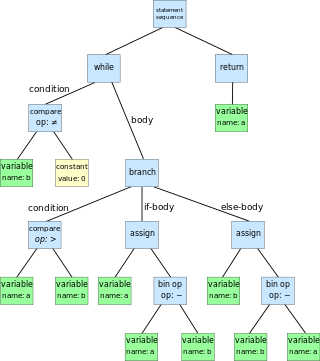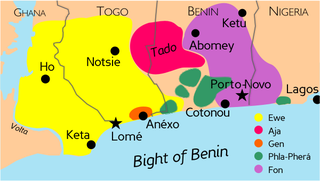In linguistics, syntax is the study of how words and morphemes combine to form larger units such as phrases and sentences. Central concerns of syntax include word order, grammatical relations, hierarchical sentence structure (constituency), agreement, the nature of crosslinguistic variation, and the relationship between form and meaning (semantics). There are numerous approaches to syntax that differ in their central assumptions and goals.

The Standard Generalized Markup Language is a standard for defining generalized markup languages for documents. ISO 8879 Annex A.1 states that generalized markup is "based on two postulates":
A Uniform Resource Identifier (URI) is a unique sequence of characters that identifies an abstract or physical resource, such as resources on a webpage, mail address, phone number, books, real-world objects such as people and places, concepts. URIs are used to identify anything described using the Resource Description Framework (RDF), for example, concepts that are part of an ontology defined using the Web Ontology Language (OWL), and people who are described using the Friend of a Friend vocabulary would each have an individual URI.

Extensible Markup Language (XML) is a markup language and file format for storing, transmitting, and reconstructing arbitrary data. It defines a set of rules for encoding documents in a format that is both human-readable and machine-readable. The World Wide Web Consortium's XML 1.0 Specification of 1998 and several other related specifications—all of them free open standards—define XML.

In computers, case sensitivity defines whether uppercase and lowercase letters are treated as distinct (case-sensitive) or equivalent (case-insensitive). For instance, when users interested in learning about dogs search an e-book, "dog" and "Dog" are of the same significance to them. Thus, they request a case-insensitive search. But when they search an online encyclopedia for information about the United Nations, for example, or something with no ambiguity regarding capitalization and ambiguity between two or more terms cut down by capitalization, they may prefer a case-sensitive search.
An idiom is a phrase or expression that usually presents a figurative, non-literal meaning attached to the phrase. Some phrases which become figurative idioms, however, do retain the phrase's literal meaning. Categorized as formulaic language, an idiom's figurative meaning is different from the literal meaning. Idioms occur frequently in all languages; in English alone there are an estimated twenty-five million idiomatic expressions.

An abstract syntax tree (AST) is a data structure used in computer science to represent the structure of a program or code snippet. It is a tree representation of the abstract syntactic structure of text written in a formal language. Each node of the tree denotes a construct occurring in the text. It is sometimes called just a syntax tree.
Stratification may refer to:
Algebraic notation may refer to:
Set, The Set, SET or SETS may refer to:

Ewe is a language spoken by approximately 5 million people in West Africa, mainly in Ghana and Togo. Ewe is part of a group of related languages commonly called the Gbe languages. The other major Gbe language is Fon, which is mainly spoken in Benin. Like many African languages, Ewe is tonal as well as a possible member of the Niger-Congo family.

JSON is an open standard file format and data interchange format that uses human-readable text to store and transmit data objects consisting of attribute–value pairs and arrays. It is a commonly used data format with diverse uses in electronic data interchange, including that of web applications with servers.
In lexicography, a lexical item is a single word, a part of a word, or a chain of words (catena) that forms the basic elements of a language's lexicon (≈ vocabulary). Examples are cat, traffic light, take care of, by the way, and it's raining cats and dogs. Lexical items can be generally understood to convey a single meaning, much as a lexeme, but are not limited to single words. Lexical items are like semes in that they are "natural units" translating between languages, or in learning a new language. In this last sense, it is sometimes said that language consists of grammaticalized lexis, and not lexicalized grammar. The entire store of lexical items in a language is called its lexis.
Minimalism is a movement in visual arts, music, and other media that began in post–World War II Western art.
Language movement or Language Movement may refer to:
This page is based on this
Wikipedia article Text is available under the
CC BY-SA 4.0 license; additional terms may apply.
Images, videos and audio are available under their respective licenses.





